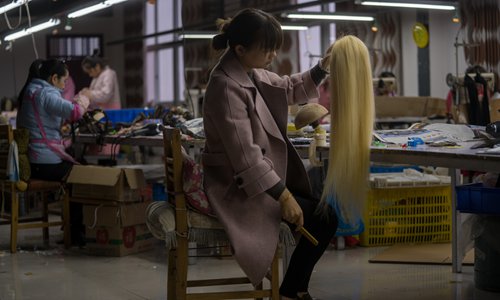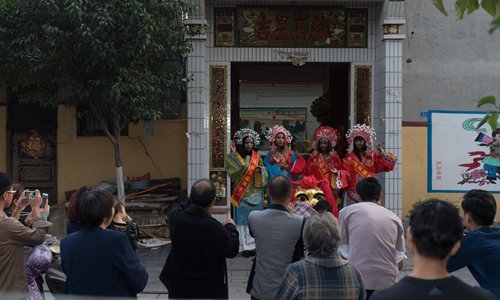
From the People's Daily app.
And this is Story in the Story.
Xuchang, Central China's Henan Province and dubbed China's "city of hairpieces", and known as the world's core wig producing area, has a history of more than one century of wig manufacturing, and its annual offline export volume accounts for more than half of the global wig market.
Every two seconds, a wig produced in Xuchang, Central China's Henan Province, is sold somewhere around the world, according to the Sanlian Life Week, a Chinese news magazine.
According to Xuchang's business authorities, as of 2017, the city has more than 240 enterprises and more than 300,000 people working in wig processing.
With the Belt and Road Initiative boosting the living standards of people in Africa, on top of mounting tariffs levied by the US government, which is affecting exports to the US market, the city has decided to turn its focus on African countries.
Today’s Story in the Story looks at how the focus of wig business in Xuchang switched to African countries.

A worker combs a half-done wig at a wig factory in Xuchang, Central China's Henan Province. (Photo: VCG)
Because of rising costs in hair reclamation and competition from e-commerce, profit margins for the traditional wig processing industry of the city have taken a big hit recently.
"Hair ornaments require intensive labor, and we have come under pressure from rising costs as China's labor prices have risen continuously," said Zhang Youcang, general manager of a wig production company based in Shenzhen, North China's Guangdong Province.
"The competition we're facing is not only from domestic peers. Many of our competitors are in Indonesia, since labor costs there are much lower than in China," Zhang added.
Ding Renhe, General Manager of the Xuchang based Ruimei Hair Production Co., Ltd, said that the entire wig production industry has been impacted by e-commerce since 2016, especially those enterprises that devoted a large number of resources to traditional distribution channels.
Despite the enormous challenge e-commerce posed to wig production enterprises in Xuchang, the emerging business model has brought huge opportunities.
As early as 2009, Alibaba.com, a business-to-business e-commerce platform under Alibaba Group, established a team to help local wig enterprises explore the global market. In the past decade, Alibaba.com has designed a slew of foreign trade models to sell wigs from Xuchang to the world.
Ni Hongfu, a deputy researcher from the Institute of Economics of Chinese Academy of Social Sciences, said that with China's Belt and Road Initiative going further, the two sides have seen an intensive trade interaction that is unprecedented, contributing to trade expansion.
African countries have seen unprecedented potential in terms of e-commerce, with transaction volumes on the "Double 11" shopping festival increasing by 78 percent in 2018, according to AliExpress, a business-to-customer site under Alibaba.

Models advertise hair products from Xuchang catering to African markets. (Photo: VCG)
Wigs are one of the most popular items on a list of fashion accessories that are well-liked by the African people, which also includes manicure kits, sequins, and beads.
According to Alibaba.com, in March, Nigeria became the third largest market for wigs on the e-commerce platform, with an increase of 74 percent in transaction volume.
"While a wig is seen as an accessory for Caucasians or Asians, it is more like a daily necessity for African people," Yang Dan said. Yang works for a domestic wig production company and has been stationed in Nigeria for 10 years.
"This is decided by their hair quality, because their curly, thin and naturally growing hair is difficult to comb straight and is prone to fall," Yang said.
“Wigs are a rigid demand for African people. Wigs are to them what clothes are to us," added Yang.
On May 10, the US increased tariffs on $200 billion worth of Chinese goods to 25 percent from the previous 10 percent rate. The increased tariffs apply to a slew of consumer products ranging from minerals and food to clothing.
While the US has downplayed the effects of the tariffs, studies have shown that the brunt of the cost has been borne by US businesses and consumers, according to the Business Insider.
A manager of a wig producing company in Xuchang, Central China's Henan Province, who asked to remain anonymous, said that while the US presently remains China's biggest export destination, orders from African countries are increasing.
Ni said that the additional tariffs imposed by the US on China's hair products will spur manufacturers to transfer their market to Africa. This will help avoid profit margin shrinkage caused by the tariffs, and remodel the global value chain of hair products to a certain extent.
(Produced by Nancy Yan Xu, Chelle Wenqian Zeng, Lance Crayon, Brian Lowe and Da Hang. Music by: bensound.com. Text from Global Times.)


